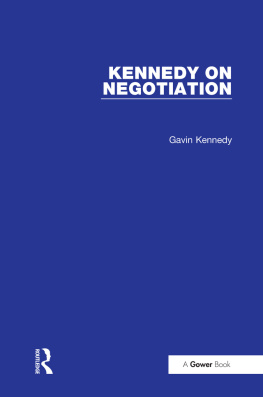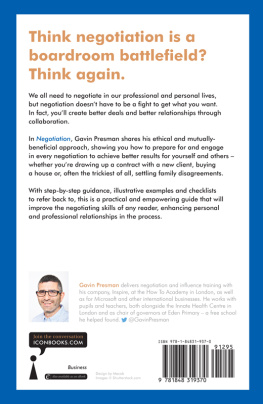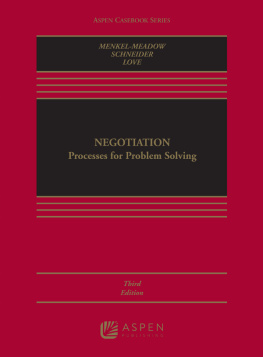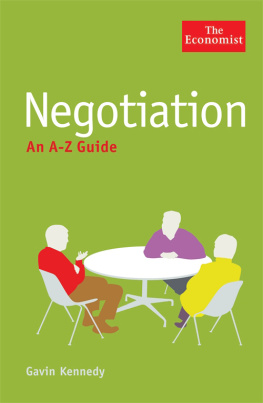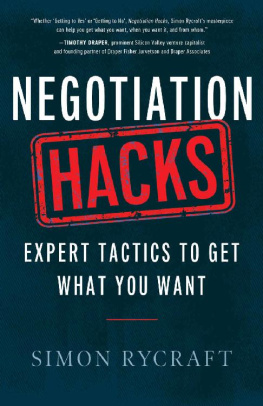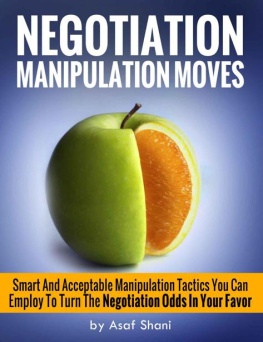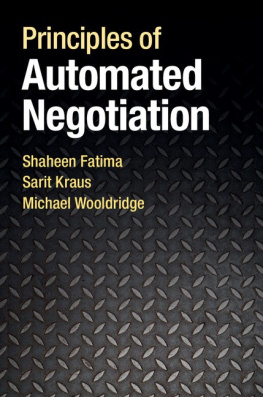KENNEDY ON NEGOTIATION
For Beatrice
Kennedy on Negotiation
Gavin Kennedy
First published 1988 by Gower Publishing
Published 2016 by Routledge
2 Park Square, Milton Park, Abingdon, Oxon OX14 4RN
711 Third Avenue, New York, NY 10017, USA
Routledge is an imprint of the Taylor & Francis Group, an informa business
First issued in paperback 2016
Copyright 1988 Gavin Kennedy
Gavin Kennedy has asserted his right under the Copyright, Designs and Patents Act 1988 to be identified as the author of this work.
All rights reserved. No part of this book may be reprinted or reproduced or utilised in any form or by any electronic, mechanical, or other means, now known or hereafter invented, including photocopying and recording, or in any information storage or retrieval system, without permission in writing from the publishers.
Notice:
Product or corporate names may be trademarks or registered trademarks, and are used only for identification and explanation without intent to infringe.
British Library Cataloguing in Publication Data
Kennedy, Gavin
Kennedy on negotiation
1. Negotiation in business
I. Title II. On negotiation
658.4'052
ISBN 9780566073021 (hbk)
Library of Congress Cataloging-in-Publication Data
Kennedy, Gavin.
Kennedy on negotiation / Gavin Kennedy.
p. cm.
Includes index.
ISBN 0-566-07302-1 (cloth)
1. Negotiation in business. I. Title.
HD58.6.K464 1997
658.4'052dc21
97-10301
CIP
Typeset in Century Schoolbook by Raven Typesetter
There has been a limited amount of original material on negotiation published lately. Occasionally someone has something new to say, or brings some specific and noteworthy experiences or original research to our attention. Mostly, however, monotonous repetition jades one's sense of wonder and excitement. Nobody to my knowledge has discussed the best original material from several sources in one volume.
Kennedy on Negotiation germinated from refereeing the manuscript of a particularly poor work on negotiation for an American publisher. The text was wholly derivative from the unacknowledged works of others and, worse, its author misinterpreted the ideas he passed off as his own. My referee's report supplied the bibliographical sources for the purloined works and recommended rejection. The commissioning editor wrote enthusiastically of my referee's report and also asked me to accept the 'usual reader's fee of $50' and a copy of the book when (!) it was published. I took the fee and declined the book.
Negotiation texts are in danger of sliding into a dead-end. The so-called popular market in books on negotiation is going nowhere, except in the endless re-cycling of most of what we already know about negotiation and of the most effective ways to train negotiators. The problem is that 'what we already know' is dispersed in numerous books and a few video packages, with little cross-referencing to or even recognition of the others. Surprisingly, there are few on-going public controversies between the competing schools of negotiation practice. Their authors keep their work very much to themselves and eschew mention of each other.
Fundamentally different approaches to negotiation remain in isolation as if their authors were too polite to contradict others in the field. Surely studies of negotiation practice are now mature enough for a more vigorous debate?
The three main approaches are:
- negotiation as a phased behavioural process;
- negotiation as a streetwise manipulative game;
- negotiation as a principled search for a rational solution.
Each approach, of course, has several important tributaries feeding into and off it, and there is some very limited but usually hidden cross-feeding from each to the others as well.
If these approaches were merely different insights into the same phenomenon they would be of interest only to specialist trainers and a few academics. The audience for Kennedy on Negotiation, however, is much wider. All practitioners, trainers and students of negotiation can benefit from a robust - even slightly polemical - review of the main differences in current negotiating practice. Why? Because ineffective practices usually have their roots in theories asserted by people who have little practical experience and who have misunderstood the title they have practised.
There are other approaches too, such as academic works on game theory, economics, social anthropology, social psychology and history that have contributed to our understanding of negotiation. Some of them also contributed to the misleading advice that is available to practitioners and, where appropriate, I shall comment on their misinterpretations.
Let me be clear, however. This is not an exhaustive survey of the literature on negotiation. I remain a practitioner and a tutor, not a bibliophile. My only concern is with the works that improve the practice of negotiation. If I delve deep on occasion, it is only to root out the source of the errors that lead the innocent practitioner into costly negotiating mistakes.
Eliminating poor negotiation practice contributes as much to personal development as does the adoption of effective practice. Effective negotiating, however, can always be contaminated by poor practice creeping back in. So knowing what to avoid, but not being sure of what to do instead, means that you suffer the fate of the rabbit caught in your headlights.
The present lack of debate on the competing approaches and a lack of rigorous testing of the advice they offer, produces a suffocatingly bland genre that gives negotiation texts and training courses a bad name. Some texts state the blindingly obvious while others are positively dangerous. Practical negotiators asking for bread receive a stone.
The lack of controversy, and, as important, awareness that there are controversies, means that the acquisition of effective negotiation skills is a matter of the chance choice of approach occasioned by which book or training course you happen to come across first.
For this reason a book examining various works has a readership among practical negotiators. Hence, Kennedy on Negotiation studies the claims and assertions of important authors and their negotiation work (as in opus) and is also an assertive statement that practical negotiation when guided by sound ideas and practice does indeed work (as in achievement). Kennedy on Negotiation shows why on certain occasions negotiation works, and why alas, on other occasions, when guided by silly ideas, it doesn't.
Having read the text, you are invited to test what you have learned and retained - in a short Practice Examination (), based on the type of examination set at Edinburgh Business School (Heriot-Watt University) for the MBA elective in Negotiation. This consists of a short case study with some pertinent questions, and some longer essays (choose four out of ten) on some of the themes of the book.
Of course, you can cheat but you won't learn or prove much that way! Alternatively, you can set aside two to three hours and attempt the questions just like in a normal examination. Please use your own words and not just copious extracts from my text (I will recognize my work if you do!).
Should you like me to assess what you have written - and you do not have to agree with my versions of the issues to pass, because well argued dissent is always welcomed - please follow the instructions when you send your answers to me. I will reply to every set of examination answers I receive with a set of model answers plus my comments on your work (and, no, you will not receive invitations to buy time shares and double glazing or to invest in 'get-rich-quick' scams!). Good luck!

